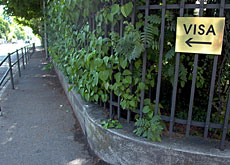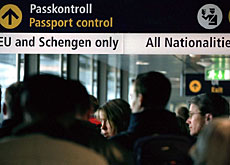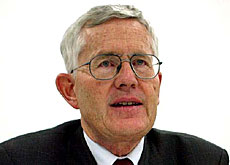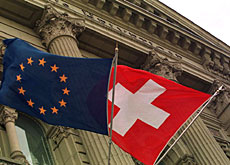Non-EU citizens face travel obstacles

Citizens from most non-EU countries, who are living in Switzerland, now need a visa to travel to European countries which have signed the Schengen agreement aimed at combating illegal immigration.
A Swiss delegation is heading to Brussels on Tuesday to demand that the requirement be lifted.
Under the Schengen accord, many non-EU citizens will require a visa to enter any of the 15 signatory countries. The restrictions do not apply to nationals of countries which already have visa-free access to the Schengen bloc, such as the United States.
For those affected, the application process for a visa is likely to take several months, according to Vania Alleva of the Swiss building and industry union.
“A Balkan national who wants to visit their home country will be subjected to a pile of red tape at the relevant embassies in order to obtain a valid visa,” she explained.
Alleva said workers had already cancelled holidays because they were unlikely to get a visa in time.
Brussels mission
Union representatives will be joined next week in Brussels by members of the Forum for the Integration of Migrants.
They plan to ask the European Parliament to allow non-EU citizens to enter Schengen signatory countries with only their passport and their Swiss residency permit.
The 15 Schengen countries are: Austria, Belgium, Denmark, Finland, France, Germany, Iceland, Italy, Greece, Luxembourg, Netherlands, Norway, Portugal, Spain and Sweden.
All these except Norway and Iceland are EU member countries. Britain and Ireland are the only EU members not to have signed up to Schengen.
Lack of action
Alleva said they had been forced to take the matter to Brussels because the Swiss government was not willing to take action itself.
She said the union had contacted the Swiss justice minister, Ruth Metzler, and asked her to intervene.
But according to Alleva, Metzler said the government could not step in because it was still in the process of negotiating bilateral accords with the EU.
“Finalising the bilateral accords was more important to the authorities than half a million Yugoslavs, Bosnians, Macedonians and Turks who live in Switzerland,” she said.
Existing delays
The French consulate in Geneva introduced a new application procedure on July 1 in a bid to speed up the process.
Applicants can now speak to administrators via telephone instead of having to make applications in person.
Previously, between 200 and 300 people arrived at the consulate each day to apply for a visa.
The consulate acted after residents close to the consulate complained about the number of applicants sleeping on the pavement.
The Swiss government announced last week that it was close to reaching an agreement with the EU over the Schengen accord.
Negotiations began in 1992, but there are still some sticking points over tax fraud.
Switzerland has already managed to modify the agreement to fit in with its laws, but concern remains that procedures relating to tax fraud could be extended to tax evasion, threatening the country’s cherished banking secrecy rules.
swissinfo with agencies
A Swiss delegation is heading to Brussels on Tuesday to ask the European Parliament to overturn the restrictions.
The delegation claims the visa application procedure will be unacceptably long.
It will ask that non-EU citizens only have to produce their passport and Swiss residency permit instead of a visa.

In compliance with the JTI standards
More: SWI swissinfo.ch certified by the Journalism Trust Initiative



You can find an overview of ongoing debates with our journalists here. Please join us!
If you want to start a conversation about a topic raised in this article or want to report factual errors, email us at english@swissinfo.ch.